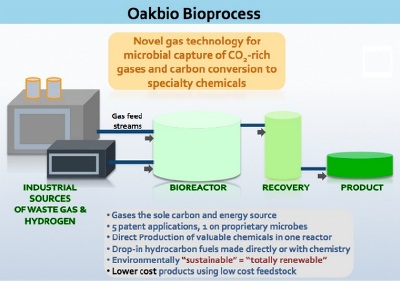Oakbio, a Sunnyvale- based private technology company engaged in the manufacture of chemicals and fuels utilized in microbial manufacturing processes, declared that it has formulated a microbe-based technology to capture carbon dioxide from unused industrial gas streams and to change the carbon into fuels and chemicals. The company has been formulating this technology by deploying man-made gas mixtures and other gas samples supplied by the industry.
 Bioprocess converts CO2-containing gases from industrial sources into valuable chemical products. Credit: Oakbio
Bioprocess converts CO2-containing gases from industrial sources into valuable chemical products. Credit: Oakbio
Oakbio identified the microbes that are adapted to breed in darkness, an environment where their only carbon resource is carbon dioxide gas and energy source is hydrogen gas. The hydrogen gas required for the process can be produced utilizing renewable energy and the elimination of carbon dioxide from the flue gas precludes the release of CO2 in atmosphere. The process comes handy for the production of fuels and chemicals in a novel eco-friendly way.
Production of carbon dioxide and its release into the atmosphere is a connected and unavoidable element of most of the industrial processes. The technologies presently utilized to bring down the level of greenhouse gas (GHG) mostly concentrate on the use of geo-sequestration and CO2 capture methods. But these applications need access to geological formations that are appropriate for geo-sequestration, and necessitate new levels of risks and doubts while increasing the cost of such applications thus remaining unsuccessful to achieve any value from the trapped carbon.
According to Russell Howard, Oakbio’s CEO, the microbe-based procedure deployed by the company captures CO2 from the flue gas of the industries utilizing a clean process and changes it on the very site into useable chemicals and biomass. The method while bringing down the level of CO2 in the atmosphere also allows the conversion of CO2 into valuable fuels and chemicals.
Brian Sefton, CTO and President Oakbio, stated that the process developed by the company utilizes special microbes that capture CO2 in a natural way without requiring investment on plants or the use of feedstock from biomass. He added that the manufacture of chemicals will not affect the production of commodity sugars or fuel the disputes in the use of feedstock for human consumption and for the manufacture of biofuel and chemicals.